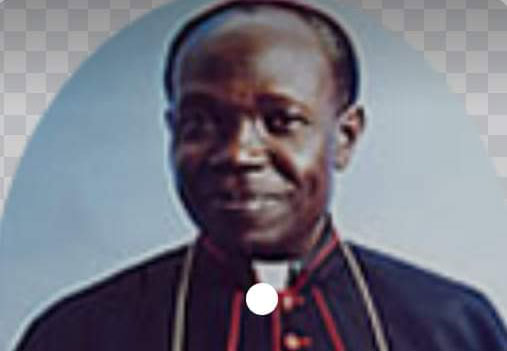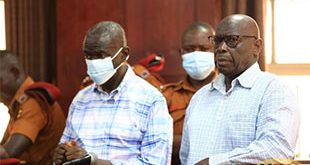
Tororo, Uganda | THE INDEPENDENT | Archbishop Emeritus of Tororo Diocese Denis Kiwanuka Lote, 84, has died. Lote died on Sunday at Nsambya. The demise of the second metropolitan of Tororo was announced by The Most Rev. Dr. Emmanuel Obbo.
The deceased has for the last two weeks been admitted to Nsambya Hospital battling a yet to be disclosed illness.
“The Most Rev. Dr Emmanuel Obbo, A.J regrets to inform you of the death of the Most Rev. Denis Lote Kiwanuka, Emeritus Archbishop of Tororo. He passed on in the morning…The Burial arrangements will be announced at a later time,” a message from the Uganda Episcopal Conference reads in part.
Born in 1938 in Kadumure Village, in present-day Pallisa District to the little-known Bakenye community, the prelate during his active years was known for strengthening evangelization and promoting education which he repeatedly singled out as the only tool for development.
Upon finishing his priestly studies Fr. Kiwanuka was ordained to the Priesthood by Bishop James Odongo in 1965 and served the then diocese of Tororo in many capacities for several years. He was elected to be the First ordinary of Kotido in 1991 and was subsequently consecrated as a bishop on August 18 by Emmanuel Cardinal Wamala, the then Archbishop of Kampala Archdiocese.
After several years of pioneering Kotido diocese, Pope Benedict XVI transferred him back to his mother diocese in 2007, where he was to serve as the second Metropolitan filling the See that had fallen vacant upon the retirement of Archbishop James Odongo.
However, his departure from Kotido was messy since he was no longer on good terms with a section of priests and Christians in the area. Shortly before his elevation to Archbishop, there was an incident in Morulem Mission, in Abim district where a group of Christians backed by armed thugs besieged his residence protesting against his refusal to ordain into priesthood an Acholi Labwor deacon.
During the incident, the bishop was beaten up. It was the army that came to his rescue and one gunman who had broken into a room where he was hiding was shot and injured in the ensuing scuffle.
To many, his ‘transfer’ could have been done to solve the impasse and return sanity in the diocese since the faithful seemed to be thirsty for the blood of the man in the robe. After his departure, Kotido Diocese remained vacant for two years. Eventually, in 2009 Giuseppe Filippi was elected as its second ordinary.
In Tororo, Kiwanuka received a warm welcome and his installation will remain in the memories of those who attended the ceremony. The colorful event of a son who had returned home’ had some light moments that made it distinct.
For instance, one of the priests presented his new Archbishop with a new packet of Sportsman cigarettes sending guests into hysterical laughter. But, the priest who presented the gift insisted that the Archbishop could need the gift in his free time.
Away from the light moments, the task ahead of replacing Archbishop Odongo was not a simple one. Odongo’s contribution and service to the growing Church in Tororo, Uganda, and East Africa, in general, marked him to be a uniquely wise and memorable cleric – who even got the wonderful privilege of participating in the last sessions of the Vatican II Ecumenical Council.
However, one can say that Lote-Kiwanuka matched up to the challenge and he was blessed that during his entire reign at the helm of the Tororo Archdiocese his predecessor was alive thus giving him continued support.
While serving and during his retirement, Archbishop Lote-Kiwanuka was strongly convinced that it was Africa’s turn to send missionaries thus encouraging more locals to join missionary societies, like Mill Hill which is popular in the region.
Kiwanuka has also been a strong activist for the mitigation of climate change and its effects. He could not forget to remind the faithful, leaders, and fellow clergy on the matter whenever an opportunity presented itself. He used every platform to call on the global church to find ways of reconciliation between the earth as a victim and man as an offender.
“Environmental protection has become a global issue deserving the attention of everybody. Just as the HIV/AIDS pandemic not only infects some people but affects everybody, so also global warming infects and affects everybody. For this reason, the Church should through this Synod seriously address the issue of climate change as a moral obligation for everybody,” Kiwanuka told the synod of bishops from Africa in 2009.
On the political scene, the deceased constantly reminded the government that the church cannot keep away from politics because it has to expound on what the scriptures say about human life, including politics and economics. His observation came at a time when government authorities tried to push clerics to the flanks whenever they commented or gave advice on political matters.
“Politics is the way God wishes his people to be governed and there are many passages in the Bible which support this like the parable of the Good Shepherd. It is the reason the Church is involved in every aspect of human life,” he was once quoted by a local Newspaper.
His reign as a prelate in Tororo never went without challenges. Among the several barriers that Archbishop Lote-Kiwanuka met was the creation of a breakaway sect by several priests under his Archdiocese in 2010. Named theCatholic Apostolic National Church, thebreakaway sect of the Roman Catholic Church, was registered with the Government as an independent church attracting sharp criticism but also panic in Tororo Archdiocese where it had originated.
Archbishop Lote-Kiwanuka served Tororo until when reached the mandatory retirement age of 75. As a norm, he wrote to the Holy See which accepted his retirement request.
*****
URN
 The Independent Uganda: You get the Truth we Pay the Price
The Independent Uganda: You get the Truth we Pay the Price


